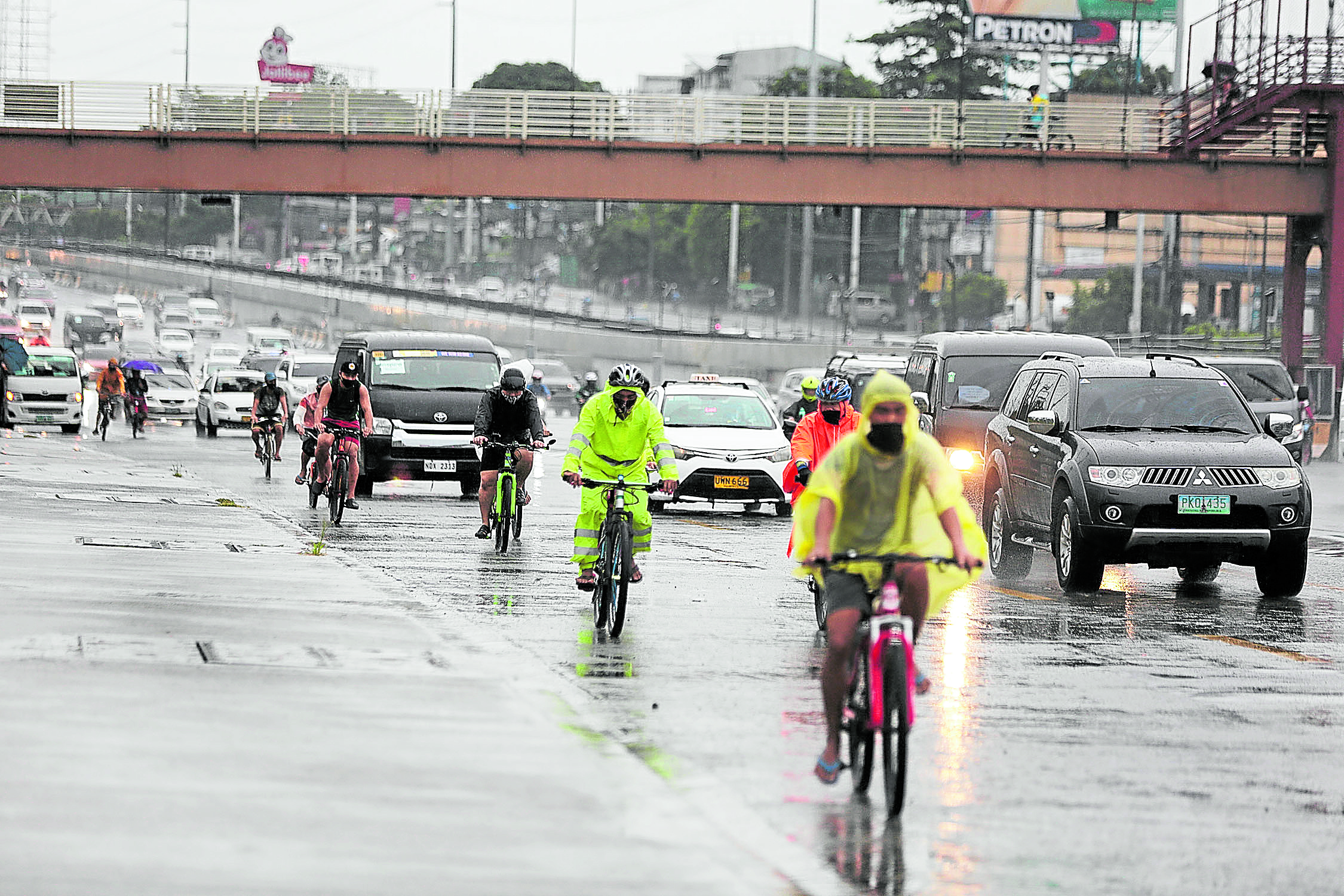Palace: Rise in fresh cases ‘doesn’t inspire’ easing of quarantine in MM

VIRUS AND RAIN Without buses and jeepneys, people ride bicycles to work on Commonwealth Avenue in Quezon City on rainy Thursday morning, risking pneumonia or contracting the new coronavirus that causes the severe respiratory disease COVID-19. —GRIG C. MONTEGRANDE
The rise in “fresh” cases of the new coronavirus “does not inspire relaxation” of quarantine restrictions in Metro Manila next week, Malacañang said on Thursday.
But the final decision is up to President Duterte, presidential spokesperson Harry Roque said.
“It does not inspire relaxation,” Roque said at a news briefing when asked to comment on the spike of fresh coronavirus cases in recent days.
The Department of Health (DOH) reported 443 more coronavirus infections on Thursday, raising the national caseload to 24,175. Of the additional cases, 253 were considered fresh, or those who tested positive for the virus in the last three days, and 190 were “late,” or those who tested positive earlier but whose results were handed in only recently.
Large increases
On Wednesday, the DOH reported 452 fresh cases, the highest in a single day since the department modified its reporting system to reflect new infections and backlog cases. It reported 331 fresh cases on Tuesday and 280 on Monday.
Article continues after this advertisementRoque said the Inter-Agency Task Force on Emerging Infectious Diseases, the temporary government body overseeing the administration’s response to the coronavirus crisis, had drafted recommendations to the President, who would announce his decision next Monday on whether the quarantine restrictions would stay or be loosened to allow a more vigorous return to economic activity.
Article continues after this advertisementMetro Manila and several parts of the country eased into general community quarantine on June 1 as the country began a phased exit from one of the strictest lockdowns in the world forced by the coronavirus pandemic.
Other parts of the country with low risk for transmission of the virus are under modified general community quarantine.
Leaks on social media
The quarantine is assessed every two weeks and a decision reached on whether to ease or tighten the restrictions based on current conditions.
Roque warned the public against believing supposed task force document leaks on social media, stressing the group’s decisions were not final as these were subject to appeal.
“The Department of the Interior and Local Government is already in contact with the local government[s], so they know their possible classification. They are given the opportunity to appeal so that by the time the President announces it on Monday, there are no more appeals,” he said.
Earlier, Roque said Metro Manila and other parts of the country under general community quarantine might “not graduate” if the number of fresh coronavirus cases continued to rise.
He said the metropolis could revert to the stricter modified enhanced community quarantine or stay with eased rules under general community quarantine depending on the case data.
Roque defended the task force decision last month to loosen the restrictions in Metro Manila and other parts of the country despite the projection by University of the Philippines researchers that coronavirus cases would hit 24,000 this month if the quarantine was prematurely eased.
“The [task force] made the right decision. We saw the economy reopen. Our death rate is limited to single digits on a daily basis. It’s also a consolation that most of the sick are asymptomatic or mild, and only a few are critical cases,” he said.
No vaccine yet
But the government, he said, has accepted that cases will continue to increase because of the absence of a vaccine for COVID-19, the severe respiratory ailment caused by the new coronavirus.
The decision on whether to loosen or tighten the quarantine restrictions is “based on science and data,” Roque said.
“So if UP’s data is right, then the government’s data is right, too,” he said.
“What we are monitoring is our capacity to provide medical assistance to the critically ill. We have to balance our economy, too, for people to have jobs because they might die of hunger,” he said. —WITH A REPORT FROM TINA G. SANTOS
For more news about the novel coronavirus click here.
What you need to know about Coronavirus.
For more information on COVID-19, call the DOH Hotline: (02) 86517800 local 1149/1150.
The Inquirer Foundation supports our healthcare frontliners and is still accepting cash donations to be deposited at Banco de Oro (BDO) current account #007960018860 or donate through PayMaya using this link.